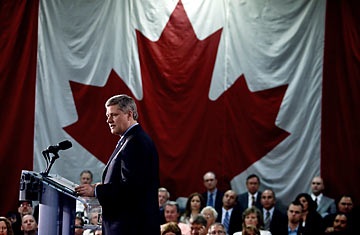
Canadian Prime Minister Stephen Harper outlines his government's progress on its economic action plan during a town-hall meeting in Cambridge, Ontario, on June 11, 2009
Just as it seemed Canada was over the worst of the global recession, it's been sideswiped by bad economic news that has forced its recovery into the ditch.
A sharp drop in demand for Alberta oil, plus auto-plant shutdowns in Ontario, have pushed Canada's trade deficit for May to an all-time high of $1.2 billion. This is in contrast to to a much smaller merchandise-trade deficit of $346 million reported in April and a healthy surplus of $979 million in March, according to the government agency Statistics Canada.
Meanwhile, employment continues to plummet — manufacturers axed 25,700 jobs in June as the automotive industry extended its downward spiral — and the Canadian loonie has climbed to nearly US$0.90 from a low of US$0.78 earlier in the year. The hollowing-out of manufacturing in Ontario, combined with a strong currency, means Canada's export sector is taking a beating not seen in decades, with no sign of relief on the horizon.
Why is Canada's economy suddenly cratering? Many in Canada blame the U.S., the country's biggest trading partner, whose bankrupt car companies have thrown a wrench into the domestic automotive industry. At the same time, continued contraction of the U.S. economy means energy exports are suffering. (Canada is the biggest supplier of foreign oil to the U.S. economy, ahead of Saudi Arabia and Venezuela.) Year-over-year energy exports tanked 54%, to $4.8 billion, for the month of May, and automotive exports fell 38%, to $2.67 billion. Total year-over-year exports declined 33%, to $25.3 billion, in May.
"Things are really bad here in Canada," says Jayson Myers, president of Canadian Manufacturers & Exporters, the country's largest trade and industry association. "Our manufacturing and export performance is the worst it's been since the end of World War II." He points to a 30% reduction in manufacturing orders over a six-month period ending in March 2009 and a loss of 221,000 manufacturing jobs in the past 12 months as evidence of the deepening crisis.
On the plus side, there was some improvement in commodity prices in May — but it was more than offset by an appreciating currency and lower export volumes, which crushed trade receipts. As a result, second-quarter GDP is expected to contract 3.1% on an annualized basis, according to the Toronto-based investment dealer CIBC World Markets. "I wouldn't be surprised if June was as bad as May," says CIBC economist Krishen Rangasamy, referring to Canada's trade deficit. He expects the country's balance of trade to begin improving in the fourth quarter, with annualized GDP growth of 2.5% and 2.1% in Canada and the U.S., respectively. That sounds promising, but it's largely predicated on a successful restructuring of GM and Chrysler and a rebound in consumer confidence in Canada and the U.S. If these prickly issues do not show signs of real improvement, it's likely that the Canadian and U.S. economies will continue to shrink, or at best move sideways.
Economist David Rosenberg, of investment firm Gluskin Sheff & Associates in Toronto, says Canada's trade deficit is the result of an overvalued loonie bumping up against a lingering downturn in U.S. consumer spending. "The Canadian dollar's overvaluation is a major impediment to the manufacturing sector," says Rosenberg, former chief economist at Merrill Lynch in New York City, noting that the loonie has overshot its real value by about US$0.04.
Economists predict a contraction in the Canadian economy of between 1.4% and 1.9% this year, followed by tepid growth of 2.4% to 2.7% in 2010. If Canada hopes to get back on the road to recovery, not only will it have to erase its burgeoning trade deficit, but just as important, the country's volume of trade will have to make up for lost ground in 2009. Right now, achieving either looks to be a long way off.
